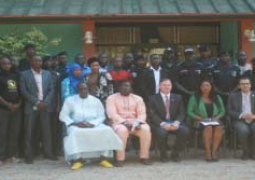The project is designed to strengthen NGOs’ capacity in order to strengthen programme design, management and implementation and improve service delivery in the fight against poverty.
One of the areas of focus of the project is NGO performance evaluation that seeks to identify and deliver trainings in five modules, namely performance standards, quality assurance, learning events, performance assessments and staff development.
According to officials, the training will provide learning events on NGO performance standards carry out learning events focusing on best practices on NGO performance standards, measures to address NGO weaknesses, and dissemination of measures for NGOs to achieve performance standards.
Speaking at the opening ceremony of a weeklong training held at TANGO conference hall in Kanifing yesterday, Kebba K. Barrow, TANGO programme officer for networking, said the objective of the training is for efficiency and effectiveness of the NGOs in their operations.
This will focus on organizational development, management, communication, strategic planning, partnership building, advocacy and financial management, he said.
Banna Sawaneh, in his presentation, explained that strategy is the direction and scope of an organization over a long term, which achieves advantage in a changing environment through its configuration of resources and competences with the aim of fulfilling stakeholder expectations.
He said strategic planning is the process by which the guiding members of an organization envision its future and develop the necessary procedures and operations to achieve that future.
According to him, strategic planning used by community groups, government departments, NGOs/civil society organizations and businesses to develop blueprint for action and change the process should be community-based, inclusive and participatory to allow for maximum stakeholder involvement and input.
“NGO values comprise the principles, standards, and actions considered worthwhile in the organization, how people treat each other, how groups conduct business and what is most important to the organization,” he said.
For his part, Suruwa Jaiteh, consultant, said programme evaluation aims to evaluate performance within each sector, unit, division and community group and make comparative assessment of the different item groups.
At the end of the eight-day training, participants are expected to have operational policy document based on the training modules, which will also improve their effectiveness and efficiency at the community level.



